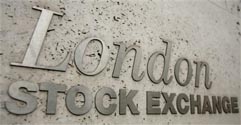Barclays reports profits amid calls to end "bonus culture"
 London- Barclays Bank Monday reported pre-tax profits of 6.08 billion pounds (9 billion dollars) for 2008 as a fierce debate about bonus payments in the banking industry raged in Britain.
London- Barclays Bank Monday reported pre-tax profits of 6.08 billion pounds (9 billion dollars) for 2008 as a fierce debate about bonus payments in the banking industry raged in Britain.
The result, boosted by last year's acquisition by Barclays of assets of Lehman Brothers, the failed US investment bank, remained nonetheless 14 per cent below its 2007 figures.
Barclays chief executive John Varley described the results as "quite good" given that 2008 had been an "extraordinarily challenging year" for the banking sector.
Barclays, Britain's fourth-biggest bank, last year declined to take up the British government offer to recapitalize the banking system, insisting that its finances are sound.
It instead attracted 7.3 billion pounds of investment from Middle Eastern investors from Abu Dhabi and Qatar.
Barclays had been "solidly profitable despite strong headwinds," its chairman, Marcus Agius, said Monday.
However, the bank's share price has fallen by 80 per cent over the past 12 months. Shares rose sharply by 7 per cent to 112.4 pence following the publication Monday of the 2008 results.
Aware of the sensitivity surrounding bonus payments at a time of economic crisis, sparked largely by the banking sector, Varley said Barclays would not award bonuses to executive directors for its 2008 performance.
However, an estimated 600 million pounds will be paid out in bonuses by Barclays investment banking arm, Barclays Capital.
The payments are likely to fuel a growing row over generous bonus payments handed out by British banks which have been part-nationalized under the government's bail-out package last October.
Under the terms of the package, no board directors at partly state-owned firms will receive any cash bonuses this year.
Treasury minister Yvette Cooper, who has launched a probe into general bank management - including the practice of bonus payments - has indicated her support for taking the same route as the US where the payment of cash bonuses to bank staff has been banned.
"I think there is a moral responsibility on some of these bankers, even if they are legally entitled to take bonuses, at a time when the bank is only still standing because of government intervention ... to take responsibility and consider whether they should be taking bonuses," she said.
While the Labour government is now seeking to clamp down on the bonus culture that flourished in the City of London during the period of economic and financial boom, the Conservatives have accused the government of turning a blind eye to the practice at the time.
The opposition Liberals have described government action over the issue as "pathetic."
Although Barclays is one of two major banks which did not ask for government cash, Varley said banks needed to be "sensitive to the mood of the times."
"For 2009 and beyond, we are reviewing our compensation policies and practices to ensure that they evolve appropriately," said Varley.
Prime Minister Gordon Brown was Monday described by his spokesman as being "very angry" about proposed bank bonuses and urged executives to "consider whether they should actually receive" bonuses even if they were legally entitled to them.
"We are leading the world in sweeping away the old short-term bonus culture of the past and replacing it with a determination that there are no rewards for failure and rewards only for long-term success," Brown said Monday.
Royal Bank of Scotland (RBS), which after a cash injection of 20 billion pounds is now 68-per-cent-owned by the taxpayer, is under particular attack for its plan to seek approval from the government for large bonuses totalling just under 1 billion pounds.
RBS, which has forecast a record loss of 28 billion pounds for 2008, has said it is contractually obliged to pay about 500 million pounds to former employees of the Dutch bank ABN Amro, part of which it bought in 2007.
The rest is expected to be paid to bankers in successful parts of RBS and its profitable insurance arm.
Barclays' 2008 result exceeded expectations in the City of London, where a profit of 5.3 billion pounds had been expected.
However, the figures included an "accounting profit" of its acquisition of assets of collapsed US investment bank Lehman Brothers of
2.4 billion pounds.
On the negative side, "one-off"-items included write-downs of around 8 billion pounds following the bank's exposure to risky lending in
2008.
Although Barclays had increased its global staff in 2008 by 20,000 to 150,000, pay-outs across the group would be "significantly lower" in 2008, said Varley. (dpa)
